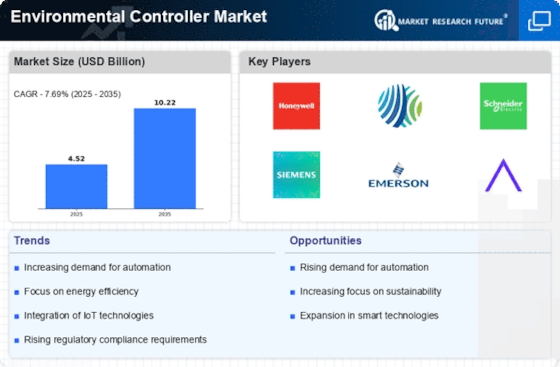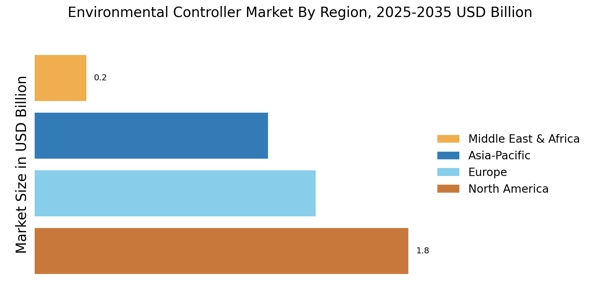Technological Advancements
Technological advancements in the field of environmental control systems are significantly influencing the Environmental Controller Market. Innovations such as IoT integration, machine learning, and advanced data analytics are enabling more efficient monitoring and management of environmental parameters. These technologies allow for real-time data collection and analysis, which can lead to improved decision-making and resource optimization. The market is witnessing a surge in demand for smart environmental controllers that can adapt to changing conditions and provide actionable insights. As a result, the market is expected to expand, with estimates suggesting a potential increase in market size by over 15% in the next few years, driven by these technological enhancements.
Corporate Sustainability Goals
The increasing emphasis on corporate sustainability goals is emerging as a significant driver for the Environmental Controller Market. Many organizations are setting ambitious targets to reduce their carbon emissions and enhance their overall sustainability. This shift is prompting companies to invest in environmental controllers that can help monitor and manage their environmental impact effectively. As businesses strive to meet these goals, the demand for advanced environmental control solutions is expected to rise. Market analysis indicates that companies prioritizing sustainability are likely to experience a competitive advantage, which could lead to a market growth rate of around 10% over the next few years as more firms adopt these technologies.
Rising Environmental Awareness
The increasing awareness regarding environmental issues among consumers and businesses appears to be a pivotal driver for the Environmental Controller Market. As individuals and organizations become more conscious of their ecological footprint, there is a growing demand for solutions that can help mitigate environmental impact. This trend is reflected in the rising adoption of environmental controllers, which facilitate better management of resources such as energy and water. According to recent data, the market for environmental controllers is projected to grow at a compound annual growth rate of approximately 8% over the next five years. This growth is likely fueled by the desire for sustainable practices and the need for compliance with environmental regulations, thereby enhancing the overall market landscape.
Government Initiatives and Incentives
Government initiatives and incentives aimed at promoting sustainable practices are playing a crucial role in shaping the Environmental Controller Market. Various governments are implementing policies that encourage the adoption of environmentally friendly technologies, including financial incentives for businesses that invest in energy-efficient systems. These initiatives not only support the transition towards greener practices but also stimulate market growth by making environmental controllers more accessible to a wider range of users. For instance, tax credits and grants for energy-efficient upgrades are likely to drive demand, potentially increasing market penetration by 20% in the coming years. This supportive regulatory environment is essential for fostering innovation and investment in the sector.
Consumer Demand for Sustainable Products
Consumer demand for sustainable products is increasingly influencing the Environmental Controller Market. As consumers become more environmentally conscious, they are actively seeking products that align with their values, including those that utilize environmental controllers for better resource management. This trend is prompting manufacturers to innovate and develop more sustainable offerings, thereby expanding their market reach. Data suggests that the market for sustainable products is growing at a rate of approximately 12% annually, which is likely to drive the adoption of environmental controllers across various sectors. This shift in consumer preferences is not only reshaping product development but also encouraging companies to enhance their sustainability practices.

















